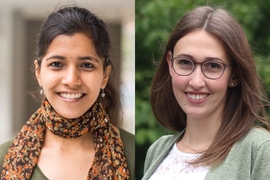The Abdul Latif Jameel Water and Food Systems Lab (J-WAFS) has announced the selection of their third cohort of graduate fellows. Two students will each receive one-semester graduate fellowships as part of J-WAFS’ Rasikbhai L. Meswani Fellowship for Water Solutions and J-WAFS Graduate Student Fellowship Programs. An additional student was awarded “honorable mention.” J-WAFS will also support the three students by providing networking, mentorship, and opportunities to showcase their research.
The awarded students, Sahil Shah and Peter Godart of the Department of Mechanical Engineering and Mark Brennan of the Department of Urban Studies and Planning, were selected for the quality of their research as well as its relevance to current global water challenges. Each of them demonstrates a long commitment to water issues, both in and outside of an academic setting. Their research projects focus on transforming water access opportunities for people in vulnerable communities where access to fresh water for human consumption or for agriculture can improve human health and livelihoods. From developing a way to use aluminum waste to produce electricity for clean water to making significant improvements to the energy efficiency of desalination systems, these students demonstrate how creativity and ingenuity can push forward transformational water access solutions.
2019-20 Rasikbhai L. Meswani Fellow for Water Solutions
Sahil Shah is a PhD candidate in the Department of Mechanical Engineering. He spent his childhood in Tanzania, received his undergraduate education in Canada, and worked in Houston as an engineering consultant before being drawn to MIT to pursue his interest in mechanical design and hardware. As a PhD student in Professor Amos Winter’s lab, he is now working to decrease the cost of desalination and improve access to drinking water in developing countries.
His PhD research focuses on new methods to decrease the cost and energy use of groundwater treatment for drinking water. Currently, he is exploring the use of electrodialysis, which is a membrane-based desalination process. By improving the design of the control mechanisms for this process, as well as by redesigning the devices to achieve higher desalination efficiency, he seeks to decrease the cost of these systems and their energy use. His solutions will be piloted in both on-grid and off-grid applications in India, supported through a collaboration with consumer goods maker Eureka Forbes and infrastructure company Tata Projects.
The 2019-20 J-WAFS Graduate Student Fellow
Peter Godart is a PhD candidate in the Department of Mechanical Engineering, and also holds BS and MS degrees in mechanical engineering and a BS in electrical engineering from MIT. From 2015 to 17, Godart also held a research scientist position at the NASA Jet Propulsion Laboratory (JPL), where he managed the development of water-reactive metal power systems, developed software for JPL’s Mars rovers, and supported rover operations.
Godart's current research at MIT focuses on improving global sustainability by using aluminum waste to power desalination and produce energy. Through this work, he aims to provide communities around the world with a means of improving both their waste management practices and their climate change resiliency. He is creating a complete system that can take in scrap aluminum and output potable water, electricity, and high-grade mineral boehmite. This suite of technologies leverages the energy available in aluminum, which is one of the most energy-dense materials to which we have ready access. The process enables recycled aluminum to react with water in order to produce hydrogen gas, which could be used in fuel cells or internal combustion engines to generate electricity, heat, and power for desalination systems.
Honorable mention
Mark Brennan is a PhD candidate in the Department of Urban Studies and Planning (DUSP). He studies the supply chains behind public programs that provide goods to vulnerable communities, especially in water- and food-insecure areas. His ongoing projects include studying which firms shoulder risk in irrigation supply chains in the Sahel, and how American federal assistance programs are structured to provide relief after disasters.
Brennan is currently collaborating with a team of researchers at the MIT Sloan School of Management, MIT D-Lab, and DUSP on a J-WAFS-funded project that is investigating ways to increase the accessibility of irrigation systems to small rural sub-Saharan African farmers, with a specific focus on Senegal.







